China Brands, Marketing & Consumers
China’s Best Fast-Food Restaurants: These Are the 11 Most Popular Chains in the PRC
These are China’s most popular fast-food chains and the most important trends in the industry.
Published
5 years agoon
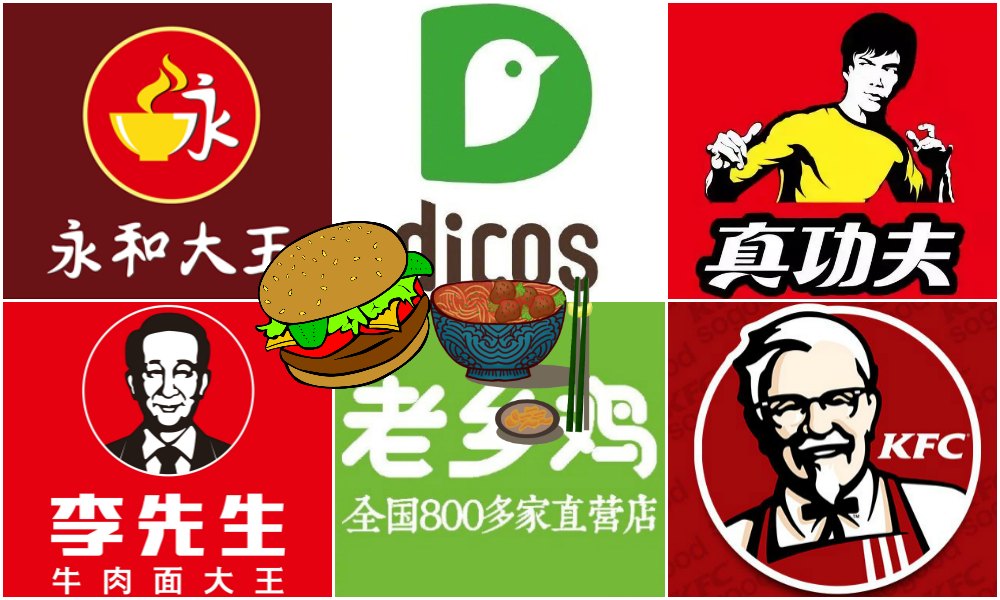
The China Cuisine Association (CCA) released a list ranking the strongest fast-food companies in China this month. The list is a top 70 (!), but here, What’s on Weibo provides an overview of the top 11 in this ranking list of fast-food restaurants in China.
Fast food has been trending on Chinese social media this week after the China Cuisine Association (综合自中国烹饪协会, CCA) issued a new ‘best brands’ report during its 23rd China Fast Fast-Food Convention.
The report by the CCA found two major trends within China’s fast-food industry.
Firstly, fast-food brands, in general, are becoming more and more popular within mainland China. The industry has seen rapid growth over the past decade, with the first half of this year already seeing a 9.4% increase compared to last year.
In the period from January to August of 2019 alone, China’s restaurant industry had a total sales revenue of 2.8 trillion yuan (355 billion US dollars) – making it one of the country’s fastest-growing industries according to Sina Finance.
Second, Chinese-style fast food brands are rising in popularity. Although KFC, McDonald’s, and Burger King still dominate the top three chart, Chinese players such as Laoxiangji (老乡鸡), Dicos (德克士), and Real Kungfu (真功夫) are becoming favorite fast-food restaurants among Chinese consumers.
On Weibo, some commenters suggest that it is inevitable for foreign players to still rule the top lists since they were the first fast-food chains to arrive in China. China’s own homegrown brands followed later and needed more time to grow, but, they predict, will only become more popular in the years to come.
Fast-food first arrived in China in the 1980s, with Kentucky Fried Chicken launching in the PRC in 1987 and McDonald’s following in 1990. The very first fast-food restaurant in China was actually not KFC, but ‘Yili’s Fast Food Shop’ (义利快餐厅), a brand established in 1906 by Scottish businessman James Neil and taken over by Chinese managers in the 1940s.
So what currently are China’s most popular fast-food chains? The list as issued by the CCA actually contains the 70 strongest fast-food companies of China.
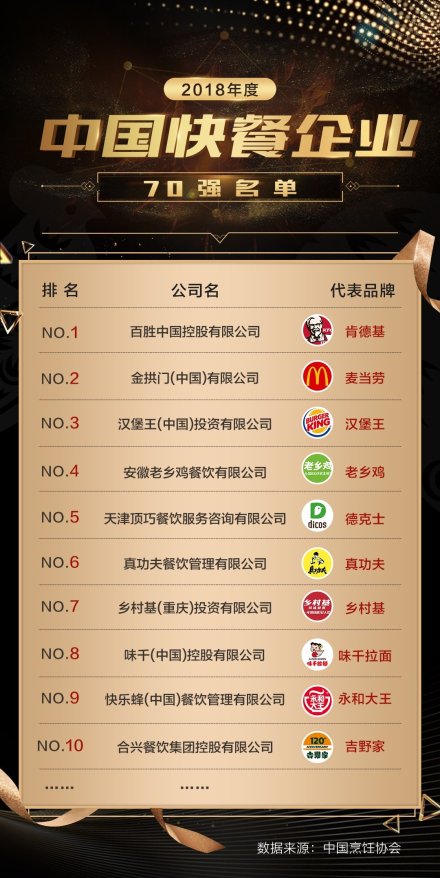
For the scope of this article, we highlight the top-ranking 11 fast-food companies of China for you, starting with number one.
#1: Kentucky Fried Chicken (肯德基)
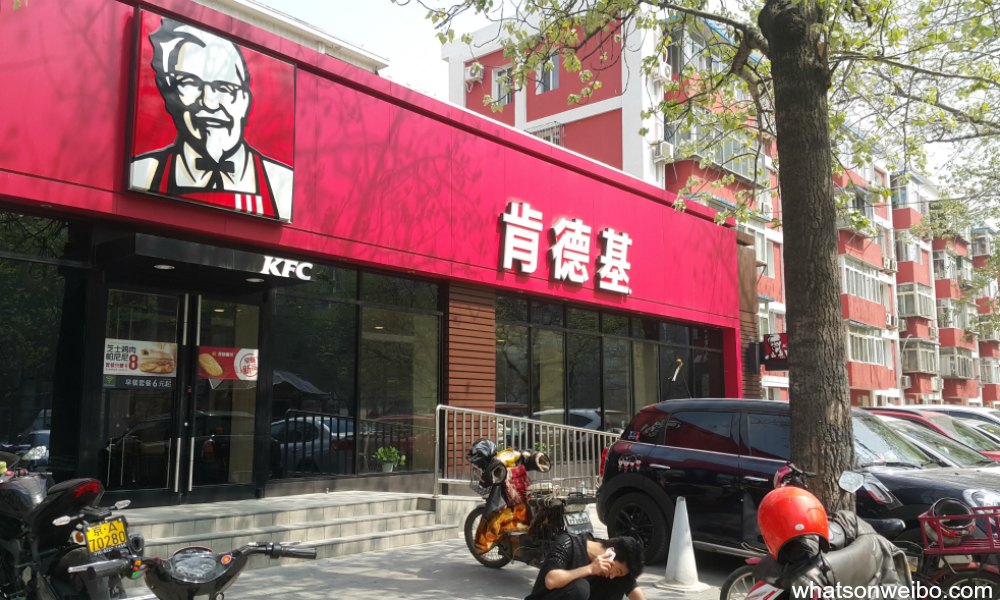
Kentucky Fried Chicken (KFC) is the major brand by Yum China (百胜中国), China’s leading restaurant company that spun off from the American Yum! Brands in 2016. Yum China has the exclusive right to operate KFC, Pizza Hut, and Taco Bell in China, and also owns the Little Sleep hotpot concept. The KFC official Weibo account almost has 2.5 million fans.
People outside of China are sometimes surprised to find that KFC is so hugely popular in the mainland. Its success story goes back to 1987, when the restaurant opened its first doors near Tiananmen Square in Beijing. Within a decade, KFC already had 100 different restaurants in China.
The question of how an American fast-food chain succeeded in becoming the number one in China, outnumbering McDonald’s, is at the center of the book KFC in China: Secret Recipe for Success. Some reasons that contribute to KFC’s success in China is the popularity of chicken in China, the chain’s management system, and the restaurant’s adaptation to local taste.
#2: McDonald’s (麦当劳)
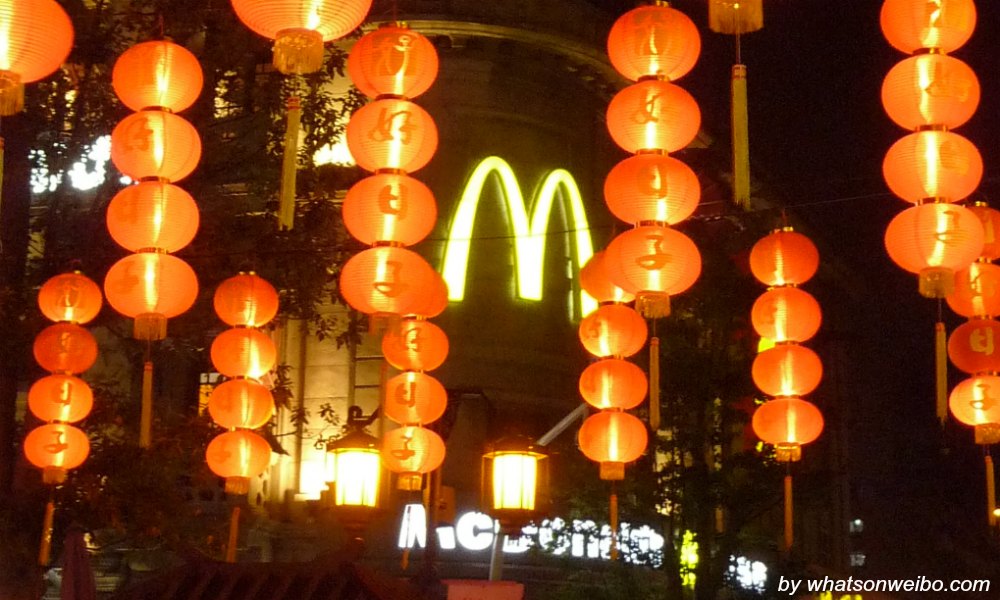
Twenty-nine years ago, McDonald’s opened China’s first restaurant in Shenzhen under the name ‘Màidāngláo’ (麦当劳), a Chinese rendering of the name.
Since 2017, the restaurant’s official name change to ‘Jīn Gǒngmén’ (金拱门), literally meaning ‘Golden Arches’, made headlines both in- and outside China. The name as displayed on the restaurants, however, has always remained the same; ‘Golden Arches’ is just the formal Chinese name of the mother company.
Despite its rocky journey in China – McDonald’s has always faced strong competition within the Chinese fast food market and had to deal with a 2014 food scandal – the American fast-food chain is still popular among Chinese, with many sharing fond memories of their first McDonald’s experience.
The Weibo account now has 1,1 million fans.
The chain still has more room for growth in the PRC, and is looking at new ways to franchise on the mainland. McDonald’s is also always adapting to local tastes. The Chinese menu offers products such as Cola Chicken wings or big chicken cutlet rice bowls.
#3: Burger King (汉堡王)

Compared to KFC or McDonald’s, Burger King is somewhat of a newcomer to the Chinese market, but its growth is also rapid: the first restaurant in China opened in 2005, and its 1000th already opened in 2018.
China’s fast-growing middle class has helped the American brand to flourish on the mainland, as did McDonald’s former president of greater China, Peter Tan, who became Burger King’s senior vice president.
Burger King has a wide and strong social media presence in China, with various official Weibo accounts actively promoting Burger King in various cities. The accounts have a personal approach and often post jokes and funny videos.
#4: Home Original Chicken / Laoxiangji (老乡鸡)

Home Original Chicken currently is the most popular Chinese-style fast-food chain in the PRC. To celebrate this fact, various restaurants around the country held some promotional events this week, even giving out lunch for free in some of its 800+ locations across the country. The promotion went trending on Weibo, with the hashtag ‘Laoxiangji invited the whole country for dinner’ (#老乡鸡宴请全国#) getting 280 million views.
The short history of the restaurant goes back to 2003 when chicken breeder Shu Congxuan opened the first location in Hefei, Anhui province. The chain’s menu items look completely different from the top 3 in this list; ‘Laoxiangji’ serves some classic pork meatballs, meatballs wrapped in fried gluten, hot and sour fish, or steamed eggplant with chili and sour sauce.
The ‘Laoxiangji’ Weibo account now has over 360,300 followers.
#5: Dicos (德克士)
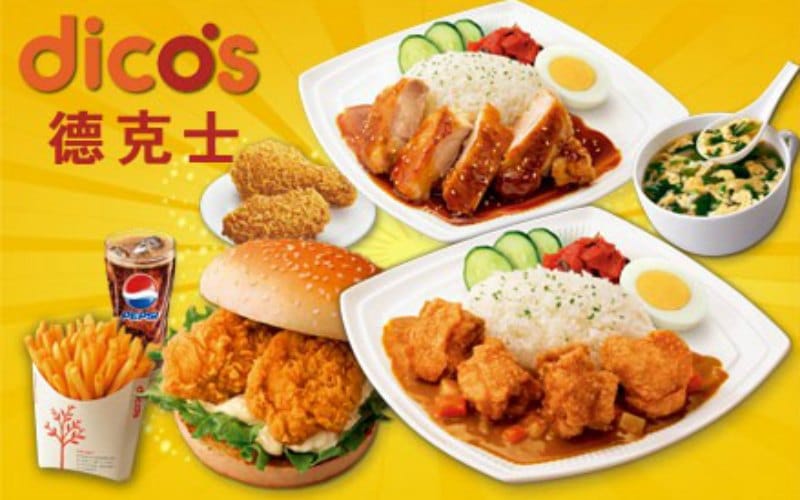
Dicos, founded in 1994, is one of the biggest Chinese-style fast-food chains in the PRC. It was founded in Chengdu and serves fried chicken and different fried chicken rice bowls, among other things. It already opened its 2000th store in 2013.
Tianjin Ding Qiao Food Service owns Dicos. In a way, you could say Dicos is one of KFC’s biggest competitors in the PRC as it is also famous for its fried chicken buckets.
The restaurant’s Weibo account has over 727,000 fans. Besides promoting fried chicken dishes, the account also regularly promotes the Dicos brands’ various sweet desserts.
#6: Real Kungfu (真功夫)

Real Kungfu is probably the fast-food restaurant with the coolest logo – which looks like an image of Bruce Lee- and brand name here.
The restaurant is headquartered in Guangzhou and opened its first restaurant in 1990. The restaurant serves various meal sets at very reasonable prices, usually including a rice bowl, soup, boiled lettuce, and a meat main dish.
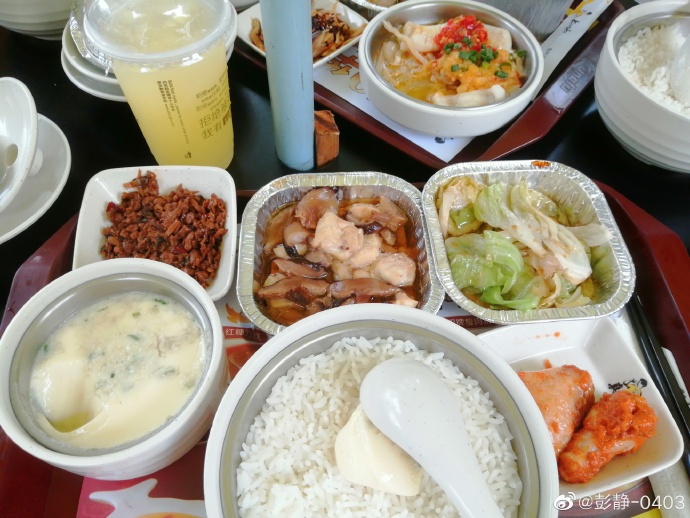
Photo of Zhen Kungfu order by Weibo user.
Weibo account @Zhengongfu has more than 188,000 followers. The account often posts about movies or series, with the chain associating itself with Chinese popular culture.
#7: Country Style Cooking (乡村基)
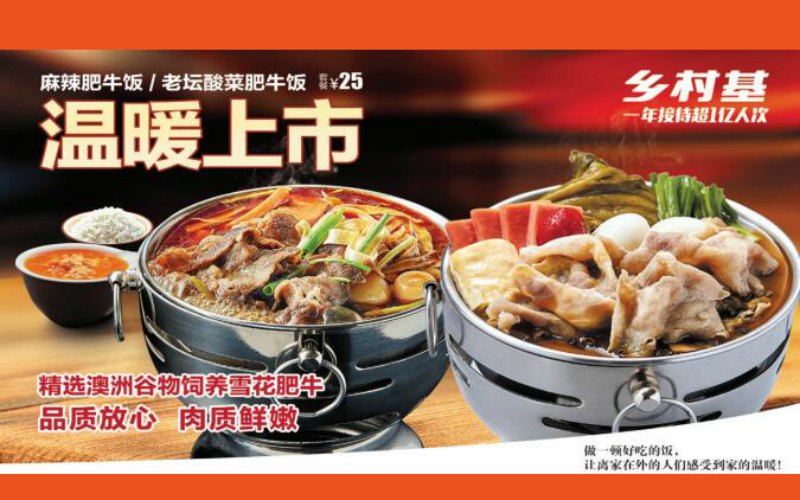
Country Style Cooking (Xiāngcūnjī, 乡村基) is originally a Chongqing restaurant that opened its first restaurant in 1996 under the name ‘Country Style Chicken’ (乡村鸡). It now has over 600 restaurants throughout China.
The restaurant’s name is literally also its theme: providing real ‘home-style’ cooking from the country to its customers. It serves some classic stir-fry dishes such as the Kung Pao Chicken (宫保鸡丁).
The brand is still relatively small on Chinese social media, having some 39000 fans on its Weibo account.
#8: Ajisen Ramen (味干拉面)
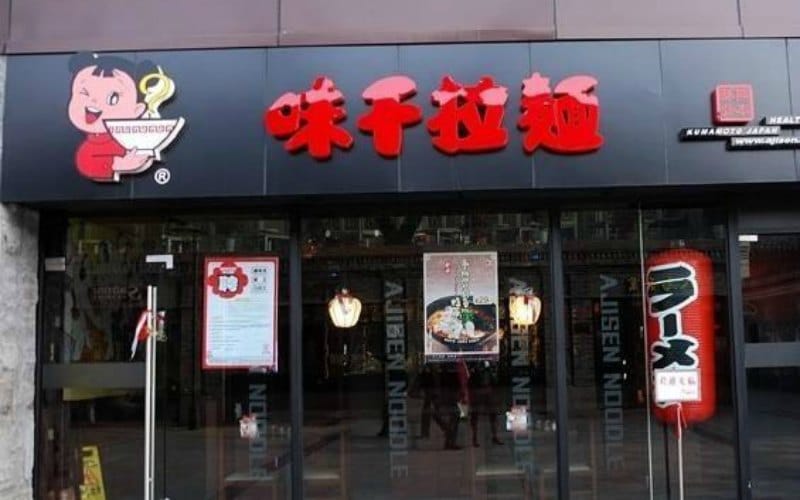
Ajisen Ramen is the first Japanese chain in this list, which focuses on Japanese ramen noodle soup dishes. It operates more than 700 noodle restaurants in Hong Kong and mainland China, but also has restaurants in other countries across the world.
Its history goes all the way back to 1968, but its franchise endeavors started later.
The chain has no presence on Weibo.
#9: Yonghe King (永和大王)
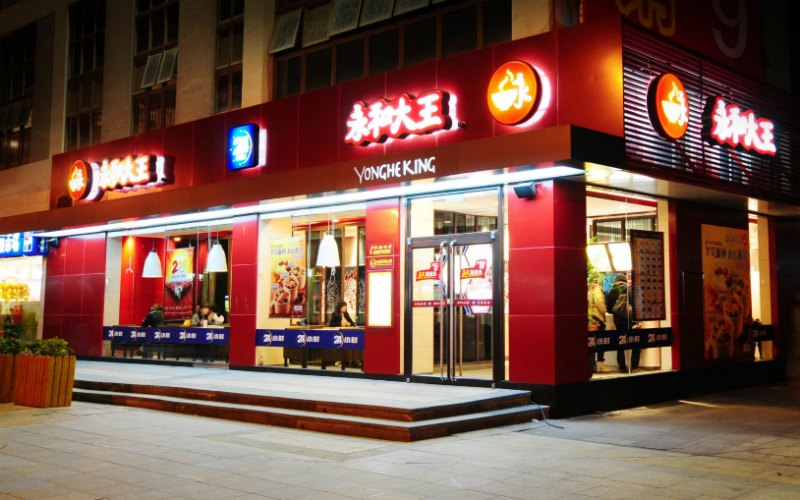
Yonghe King is another Chinese-style fast-food chain that, like Ajisen, also focuses on noodles. Its first restaurant was opened in 1995 in Shanghai.
The brand is not fully Chinese anymore, as it merged with Jollibee Foods Corporation (JFC), the biggest fast-food company in the Philippines, in 2004. Since 2016, Jollibee is 100% owner of Yonghe King.
Yonghe King’s menu is diverse, as it offers various breakfast items, meal sets with noodles or rice, and desserts. It promotes its breakfast as the perfect start of the day for busy people who have to get to work early and have no time to prepare a meal.
With almost 409,000 fans on Weibo, Yonghe King is pretty popular on Chinese social media.
#10: Yoshinoya (吉野家)

Yoshinoya is the second Japanese chain in this list and it is the oldest brand, going back all the way to 1899.
Although Yoshinoya is a ‘fast food’ chain because, some of the items on its menu are not as fast to eat. The restaurant is known for its beef bowls, but how about a one-person hotpot set?

Hop Hing Group, based in Hong Kong, is the licensed operator of Yoshinoya in Hong Kong and Mainland China. The restaurant has recently become a target of violence during the Hong Kong Protests, as it was labeled as being a Beijing supporter.
#11: Mr. Lee California Beef Noodle King (李先生加州牛肉面大王)

The Beijing brand Mr. Lee is a popular fast-food chain in mainland China that specializes in beef noodle soup. Its first store was opened in 1988.
The ‘California’ part in its time comes from the Californian Chinese-American businessman Li Beiqi (李北祺) who started the company – hence the restaurant’s name (Mr. ‘Li’ in pinyin).
Besides the beef noodle soup, the restaurant also offers rice meals, dumplings, sweets, evening snacks and more. The Mr. Lee’s Weibo account has over 55000 fans.
By Manya Koetse
Spotted a mistake or want to add something? Please let us know in comments below or email us. First time commenters, please be patient – we will have to manually approve your comment before it appears.
©2019 Whatsonweibo. All rights reserved. Do not reproduce our content without permission – you can contact us at info@whatsonweibo.com.
Manya is the founder and editor-in-chief of What's on Weibo, offering independent analysis of social trends, online media, and digital culture in China for over a decade. Subscribe to gain access to content, including the Weibo Watch newsletter, which provides deeper insights into the China trends that matter. More about Manya at manyakoetse.com or follow on X.

China Arts & Entertainment
Controversial Wanghong Livestreamers Are Becoming a Weibo Staple in China
‘Wanghong’ was a mark of online fame; now, it’s increasingly tied to controversy and scandal.
Published
2 months agoon
October 27, 2024
As livestreaming continues to gain popularity in China, so do the controversies surrounding the industry. Negative headlines involving high-profile livestreamers, as well as aspiring influencers hoping to make it big, frequently dominate Weibo’s trending topics.
These headlines usually revolve around China’s so-called wǎnghóng (网红) influencers. Wanghong is a shortened form of the phrase “internet celebrity” (wǎngluò hóngrén 网络红人). The term doesn’t just refer to internet personalities but also captures the viral nature of their influence—describing content or trends that gain rapid online attention and spread widely across social media.
Recently, an incident sparked debate over China’s wanghong livestreamers, focusing on Xiaohuxing (@小虎行), a streamer with around 60,000 followers on Douyin, who primarily posts evaluations of civil aviation services in China.

Xiaohuxing (@小虎行)
On October 15, 2024, at Shenzhen Bao’an International Airport, Xiaohuxing confronted a volunteer at the automated check-in counter, insisting she remove her mask while livestreaming the entire encounter. He was heard demanding, “What gives you the right to wear a mask? What gives you the right not to take it off?” and even attempted to forcibly remove her mask, challenging her to call the police.

During the livestream, the livestreamer confronted the woman on the right for wearing a facemask.
He also argued with a male traveler who tried to intervene. In the end, the airport’s security officers detained him. Shortly after the incident, a video of the livestream went viral on Weibo under various hashtags (e.g. #网红小虎行机场强迫志愿者摘口罩#) and attracted millions of views. The following day, Xiaohuxing’s Douyin account was banned, and all his videos were removed. The Shenzhen Public Security Bureau later announced that the account’s owner, identified as Wang, had been placed in administrative detention.
On October 13, just days before, another livestreaming controversy erupted at Guangzhou Baiyun International Airport. Malatang (@麻辣烫), a popular Douyin streamer with over a million followers, secretly filmed a young couple kissing and mocked them, continuing to film while passing through security—an area where filming is prohibited.
Her livestream quickly went viral, sparking discussions about unauthorized filming and misconduct among Chinese wanghong. In response, Malatang’s agent posted an apology video. However, the affected couple hired a lawyer and reported the incident to the police (#被百万粉丝网红偷拍当事人发声#). On October 17, Malatang’s Douyin account was banned, and her videos were removed.

Livestreamer Malatang making fun of the couple in the back at the airport.
In both cases, netizens uncovered additional examples of inappropriate behavior by Xiaohuxing and Malatang in past broadcasts. For example, Xiaohuxing was reportedly aggressive towards a flight attendant, demanding she kneel to serve him, while Malatang was criticized for scolding a delivery person who declined to interact with her on camera.
Comments on Weibo included, “They’ll do anything for traffic. Wanghong are getting a bad reputation because of people like this.” Another added, “It seems as if ‘wanghong’ has become a negative term now.”
Rising Scrutiny in China’s Wanghong Economy
Xiaohuxing and Malatang are far from isolated cases. Recently, many other wanghong livestreamers have also been caught up in negative news.
One such figure is Dong Yuhui (董宇辉), a former English teacher at New Oriental (新东方) who transitioned to livestreaming for East Buy (东方甄选), where he mixed education with e-commerce (read here). Dong gained significant popularity and boosted East Buy’s brand before leaving to start his own company. Recently, however, Dong faced backlash for inaccurate statements about Marie Curie during an October 9 livestream. He incorrectly claimed that Curie discovered uranium, invented the X-ray machine, and won the Nobel Prize in Literature, among other things.
Considering his public image as a knowledgeable “teacher” livestreamer, this incident sparked skepticism among viewers about his actual expertise. A related hashtag (#董宇辉称居里夫人获得诺贝尔文学奖#) garnered over 81 million views on Weibo. In addition to this criticism, Dong is also being questioned about potential false advertising, which is a major challenge for all livestreamers selling products during their streams.

Dong Yuhui (董宇辉) during one of his livestreams.
Another popular livestreamer, Dongbei Yujie (@东北雨姐), is currently also facing criticism over product quality and false advertising claims. Originally from Northeast China, Dongbei Yujie shares content focused on rural life in the region. Recently, her Douyin account, which boasts an impressive 22 million followers, was muted due to concerns over the quality of products she promoted, such as sweet potato noodles (which reportedly contained no sweet potato). Despite issuing public apologies—which have garnered over 160 million views under the hashtag “Dongbei Yujie Apologizes” (#东北雨姐道歉#)—the controversy has impacted her account and led to a penalty of 1.65 million yuan (approximately 231,900 USD).

From Dongbei Yujie’s apology video
Former top Douyin livestreamer Fengkuang Xiaoyangge (@疯狂小杨哥) is also facing a career downturn. Leading up to the 2024 Mid-Autumn Festival, he promoted Hong Kong Meicheng mooncakes in his livestreams, branding them as a high-end Hong Kong product. However, it was soon revealed that these mooncakes had no retail presence in Hong Kong and were primarily produced in Guangzhou and Foshan, sparking accusations of deceptive marketing. Due to this incident and previous cases of misleading advertising, his company came under investigation and was penalized. In just a few weeks, Fengkuang Xiaoyangge lost over 8.5 million followers (#小杨哥掉粉超850万#).

Fengkuang Xiaoyangge (@疯狂小杨哥) and the mooncake controversy.
It’s not only ecommerce livestreamers who are getting caught up in scandal. Recently, the influencer “Xiaoxiao Nuli Shenghuo” (@小小努力生活) and her mother were arrested for fabricating a tragic story – including abandonment, adoption, and hardships – to gain sympathy from over one million followers and earn money through donations and sales. They, and two others who helped them manage their account, were sentenced to ten days in prison for ‘false advertising.’
Wanghong Fame: Opportunity and Risk
China’s so-called ‘wanghong economy’ has surged in recent years, with countless content creators emerging across platforms like Douyin, Kuaishou, and Taobao Live. These platforms have transformed interactions between content creators and viewers and changed how products are marketed and sold.
For many aspiring influencers, becoming a livestreamer is the first step to building a presence in the streaming world. It serves as a gateway to attracting traffic and potentially monetizing their online influence.
However, before achieving widespread fame, some livestreamers resort to using outrageous or even offensive content to capture attention, even if it leads to criticism. For example, before his account was banned, Xiaohuxing set his comment section to allow only followers to comment, gaining 3,000 new followers after his controversial livestream at Shenzhen Airport went viral. Many speculated that some followers joined just to leave critical comments, but it nonetheless grew his following.
As livestreamers gain significant fame, they must exercise greater caution, as they often hold substantial influence over their audiences, making accuracy essential. Mistakes, whether intentional or not, can quickly erode trust, as seen in the example of the super popular Dong Yuhui, who faced backlash after his inaccurate comment about Marie Curie sparked public criticism.
China’s top makeup livestreamer, Li Jiaqi (李佳琦), experienced a similar reputational crisis in September last year. Responding dismissively to a viewer who commented on the high price of an eyebrow pencil, Li replied, “Have you received a raise after all these years? Have you worked hard enough?” Commentators pointed out that the pencil’s cost per gram was double that of gold at the time. Accused of “forgetting his roots” as a former humble salesman, Li lost one million Weibo followers in a day (read more here).

This meme shows that many viewers did not feel moved by Li’s apologetic tears after the eyepencil incident.
Despite the challenges and risks, becoming a wanghong remains an attractive career path for many. A mid-2023 Weibo survey on “Contemporary Employment Trends” showed that 61.6% of nearly 10,000 recent graduates were open to emerging professions like livestreaming, while 38.4% preferred more traditional career paths.
Taming the Wanghong Economy
In response to the increasing number of controversies and scandals brought by some wanghong livestreamers, Chinese authorities are implementing stricter regulations to monitor the livestreaming industry.
In 2021, China’s Propaganda Department and other authorities began emphasizing the societal influence of online influencers as role models. That year, the China Association of Performing Arts introduced the “Management Measures for the Warning and Return of Online Hosts” (网络主播警示与复出管理办法), which makes it challenging, if not impossible, for “canceled” celebrities to stage a comeback as livestreamers (read more).
The Regulation on the Implementation of the Law of the People’s Republic of China on the Protection of Consumer Rights and Interests (中华人民共和国消费者权益保护法实施条例), effective July 1, 2024, imposes stricter rules on livestream sales. It requires livestreams to disclose both the promoter and the product owner and mandates platforms to protect consumer rights. In cases of illegal activity, the platform, livestreaming room, and host are all held accountable. Violations may result in warnings, confiscation of illegal earnings, fines, business suspensions, or even the revocation of business licenses.
These regulations have created a more controlled “wanghong” economy, a marked shift from the earlier, more unregulated era of livestreaming. While some view these measures as restrictive, many commenters support the tighter oversight.
A well-known Kuaishou influencer, who collaborates with a person with dwarfism, recently faced backlash for sharing “vulgar content,” including videos where he kicks his collaborator (see video) or stages sensational scenes just for attention.
Most commenters welcome the recent wave of criticism and actions taken against such influencers, including Xiaohuxing and Dongbei Yujie, for their behavior. “It’s easy to become famous and make money like this,” commenters noted, adding, “It’s good to see the industry getting cleaned up.”
State media outlet People’s Daily echoed this sentiment in an October 21 commentary, stating, “No matter how many fans you have or how high your traffic is, legal lines must not be crossed. Those who cross the red line will ultimately pay the price.”
This article and recent incidents have sparked more online discussions about the kind of influencers needed in the livestreaming era. Many suggest that, beyond adhering to legal boundaries, celebrity livestreamers should demonstrate a higher moral standard and responsibility within this digital landscape. “We need positive energy, we need people who are authentic,” one Weibo user wrote.
Others, however, believe misbehaving “wanghong” livestreamers naturally face consequences: “They rise fast, but their popularity fades just as quickly.”
When asked, “What kind of influencers do we need?” one commenter responded, “We don’t need influencers at all.”
By Wendy Huang
Follow @whatsonweibo
Edited for clarity by Manya Koetse
Spotted a mistake or want to add something? Please let us know in comments below or email us. Please note that your comment below will need to be manually approved if you’re a first-time poster here.
©2024 Whatsonweibo. All rights reserved. Do not reproduce our content without permission – you can contact us at info@whatsonweibo.com
China Books & Literature
Why Chinese Publishers Are Boycotting the 618 Shopping Festival
Bookworms love to get a good deal on books, but when the deals are too good, it can actually harm the publishing industry.
Published
7 months agoon
June 8, 2024By
Ruixin Zhang
JD.com’s 618 shopping festival is driving down book prices to such an extent that it has prompted a boycott by Chinese publishers, who are concerned about the financial sustainability of their industry.
When June begins, promotional campaigns for China’s 618 Online Shopping Festival suddenly appear everywhere—it’s hard to ignore.
The 618 Festival is a product of China’s booming e-commerce culture. Taking place annually on June 18th, it is China’s largest mid-year shopping carnival. While Alibaba’s “Singles’ Day” shopping festival has been taking place on November 11th since 2009, the 618 Festival was launched by another Chinese e-commerce giant, JD.com (京东), to celebrate the company’s anniversary, boost its sales, and increase its brand value.
By now, other e-commerce platforms such as Taobao and Pinduoduo have joined the 618 Festival, and it has turned into another major nationwide shopping spree event.
For many book lovers in China, 618 has become the perfect opportunity to stock up on books. In previous years, e-commerce platforms like JD.com and Dangdang (当当) would roll out tempting offers during the festival, such as “300 RMB ($41) off for every 500 RMB ($69) spent” or “50 RMB ($7) off for every 100 RMB ($13.8) spent.”
Starting in May, about a month before 618, the largest bookworm community group on the Douban platform, nicknamed “Buying Like Landsliding, Reading Like Silk Spinning” (买书如山倒,看书如抽丝), would start buzzing with activity, discussing book sales, comparing shopping lists, or sharing views about different issues.

Social media users share lists of which books to buy during the 618 shopping festivities.
This year, however, the mood within the group was different. Many members posted that before the 618 season began, books from various publishers were suddenly taken down from e-commerce platforms, disappearing from their online shopping carts. This unusual occurrence sparked discussions among book lovers, with speculations arising about a potential conflict between Chinese publishers and e-commerce platforms.
A joint statement posted in May provided clarity. According to Chinese media outlet The Paper (@澎湃新闻), eight publishers in Beijing and the Shanghai Publishing and Distribution Association, which represent 46 publishing units in Shanghai, issued a statement indicating they refuse to participate in this year’s 618 promotional campaign as proposed by JD.com.
The collective industry boycott has a clear motivation: during JD’s 618 promotional campaign, which offers all books at steep discounts (e.g., 60-70% off) for eight days, publishers lose money on each book sold. Meanwhile, JD.com continues to profit by forcing publishers to sell books at significantly reduced prices (e.g., 80% off). For many publishers, it is simply not sustainable to sell books at 20% of the original price.
One person who has openly spoken out against JD.com’s practices is Shen Haobo (沈浩波), founder and CEO of Chinese book publisher Motie Group (磨铁集团). Shen shared a post on WeChat Moments on May 31st, stating that Motie has completely stopped shipping to JD.com as it opposes the company’s low-price promotions. Shen said it felt like JD.com is “repeatedly rubbing our faces into the ground.”
Nevertheless, many netizens expressed confusion over the situation. Under the hashtag topic “Multiple Publishers Are Boycotting the 618 Book Promotions” (#多家出版社抵制618图书大促#), people complained about the relatively high cost of physical books.
With a single legitimate copy often costing 50-60 RMB ($7-$8.3), and children’s books often costing much more, many Chinese readers can only afford to buy books during big sales. They question the justification for these rising prices, as books used to be much more affordable.
Book blogger TaoLangGe (@陶朗歌) argues that for ordinary readers in China, the removal of discounted books is not good news. As consumers, most people are not concerned with the “life and death of the publishing industry” and naturally prefer cheaper books.
However, industry insiders argue that a “price war” on books may not truly benefit buyers in the end, as it is actually driving up the prices as a forced response to the frequent discount promotions by e-commerce platforms.
China News (@中国新闻网) interviewed publisher San Shi (三石), who noted that people’s expectations of book prices can be easily influenced by promotional activities, leading to a subconscious belief that purchasing books at such low prices is normal. Publishers, therefore, feel compelled to reduce costs and adopt price competition to attract buyers. However, the space for cost reduction in paper and printing is limited.
Eventually, this pressure could affect the quality and layout of books, including their binding, design, and editing. In the long run, if a vicious cycle develops, it would be detrimental to the production and publication of high-quality books, ultimately disappointing book lovers who will struggle to find the books they want, in the format they prefer.
This debate temporarily resolved with JD.com’s compromise. According to The Paper, JD.com has started to abandon its previous strategy of offering extreme discounts across all book categories. Publishers now have a certain degree of autonomy, able to decide the types of books and discount rates for platform promotions.
While most previously delisted books have returned for sale, JD.com’s silence on their official social media channels leaves people worried about the future of China’s publishing industry in an era dominated by e-commerce platforms, especially at a time when online shops and livestreamers keep competing over who has the best book deals, hyping up promotional campaigns like ‘9.9 RMB ($1.4) per book with free shipping’ to ‘1 RMB ($0.15) books.’
This year’s developments surrounding the publishing industry and 618 has led to some discussions that have created more awareness among Chinese consumers about the true price of books. “I was planning to bulk buy books this year,” one commenter wrote: “But then I looked at my bookshelf and saw that some of last year’s books haven’t even been unwrapped yet.”
Another commenter wrote: “Although I’m just an ordinary reader, I still feel very sad about this situation. It’s reasonable to say that lower prices are good for readers, but what I see is an unfavorable outlook for publishers and the book market. If this continues, no one will want to work in this industry, and for readers who do not like e-books and only prefer physical books, this is definitely not a good thing at all!”
By Ruixin Zhang, edited with further input by Manya Koetse
Independently reporting China trends for over a decade. Like what we do? Support us and get the story behind the hashtag by subscribing:
Spotted a mistake or want to add something? Please let us know in comments below or email us. First-time commenters, please be patient – we will have to manually approve your comment before it appears.
©2024 Whatsonweibo. All rights reserved. Do not reproduce our content without permission – you can contact us at info@whatsonweibo.com.
Subscribe

Our Picks: Top 10 Chinese Buzzwords and Phrases of 2024 Explained

Weibo Watch: Christmas in China Is Everywhere and Nowhere

12-Year-Old Girl from Shandong Gets Infected with HPV: Viral Case Exposes Failures in Protecting Minors

Explaining the Bu Xiaohua Case: How One Woman’s Disappearance Captured Nationwide Attention in China

Story of Chinese Female MA Graduate Going Missing for 13 Years Sparks Online Storm

Death of Chinese Female Motorcycle Influencer ‘Shigao ProMax’ Sparks Debate on Risky Rides for Online Attention

Hidden Hotel Cameras in Shijiazhuang: Controversy and Growing Distrust

The Price of Writing Smut: Inside China’s Crackdown on Erotic Fiction

Weibo Watch: Small Earthquakes in Wuhan

Why the “人人人人景点人人人人” Hashtag is Trending Again on Chinese Social Media

The Hashtagification of Chinese Propaganda

Controversial Wanghong Livestreamers Are Becoming a Weibo Staple in China

Weibo Watch: “Comrade Trump Returns to the Palace”

The ‘Cycling to Kaifeng’ Trend: How It Started, How It’s Going

Hu Xijin’s Comeback to Weibo
Get in touch
Would you like to become a contributor, or do you have any tips or suggestions? Get in touch here!
Popular Reads
-

 China Insight8 months ago
China Insight8 months agoThe Tragic Story of “Fat Cat”: How a Chinese Gamer’s Suicide Went Viral
-

 China Music9 months ago
China Music9 months agoThe Chinese Viral TikTok Song Explained (No, It’s Not About Samsung)
-

 China Insight10 months ago
China Insight10 months agoThe ‘Two Sessions’ Suggestions: Six Proposals Raising Online Discussions
-

 China Digital7 months ago
China Digital7 months agoChina’s 2024 Gaokao Triggers Online Discussions on AI







